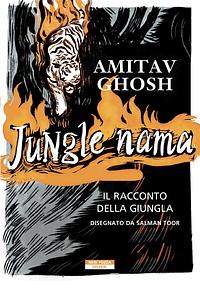You need to sign in or sign up before continuing.
Take a photo of a barcode or cover
4.5/5
“Thousands of islands rise from the rivers’ rich silts,
Crowned with forests of mangrove, rising on stilts.
This is the Sundarban, where great rivers give birth;
To a vast jungle that joins Oceans and Earth.”
Jungle Nama by Amitav Ghosh marks the renowned author’s foray into verse. The story of Bon Bibi was featured as an integral part of the narrative in Amitav Ghosh’s novel, The Hungry Tide. The legend of Bon Bibi is an important part of the culture and folklore of the Sundarbans with shrines devoted to the deity found in pockets of the area.
Jungle Nama, is the author’s retelling of an episode from the legend of Bon Bibi, the goddess who protects the forests and all living creatures who seek her aid and her warrior brother Shah Jongoli . Dokkhin Rai is a demon–like creature , who assumes the avatar of a tiger in hunting humans who dare to trespass into his part of the forest. When Dhona, a greedy merchant enters the demon Dokkhin Rai’s territory to collect honey, timber and beeswax without seeking his permission, Dokhin Rai asks for a human sacrifice as penance. Dhona offers the life of the young lad Dukhey to appease the demon. What follows is the story of how Bon Bibi and her brother Shah Jongoli help Dukhey and teach the villains a lesson. While this is basically a story of good vs evil, there is also a deeper message of conservation of the forests and environmental protection.
The original source material , Bon Bibir Johurnama, is written in Bengali meter verse, ‘dwipodi –poyar’. Amitav Ghosh’s English translation is also rendered in poyar- like meter (couplets of twenty- four syllables).This slim volume also features stunning black and white illustrations by Salman Toor which perfectly complement the text. I had heard rave reviews of the audio narration of this book and was happy to pair my reading with the audiobook for an immersive experience. Ali Sethi’s narration is brilliant and the accompanying melodious score is captivating .
Listening to this short yet immensely entertaining audiobook transported me back to my childhood and fond memories of my late father (to whom I credit my love for books and reading) reading folk and fairy tales of Bengal (Thakurmar Jhuli) to me. I remember him voicing the characters and making the stories come alive with his narration – an experience we both enjoyed. If he were alive today, I am sure he would have loved Ali Sethi’s rendering of Amitav Ghosh’s Jungle Nama.
I’ll admit that The Hungry Tide was not my favorite Amitav Ghosh novel. But I loved the backdrop of the Sundarbans and the lore surrounding it. Jungle Nama is a commendable effort in bringing the folklore of the Sundarbans to a wider audience. I only wish it covered the complete tales of Bon Bibi and just not part of the story. This is a wonderful and entertaining read for both children and adults. I'm thrilled to add this to my personal collection.
My Rating for the book: 4/5
My rating for the audio: 5/5
“Thousands of islands rise from the rivers’ rich silts,
Crowned with forests of mangrove, rising on stilts.
This is the Sundarban, where great rivers give birth;
To a vast jungle that joins Oceans and Earth.”
Jungle Nama by Amitav Ghosh marks the renowned author’s foray into verse. The story of Bon Bibi was featured as an integral part of the narrative in Amitav Ghosh’s novel, The Hungry Tide. The legend of Bon Bibi is an important part of the culture and folklore of the Sundarbans with shrines devoted to the deity found in pockets of the area.
Jungle Nama, is the author’s retelling of an episode from the legend of Bon Bibi, the goddess who protects the forests and all living creatures who seek her aid and her warrior brother Shah Jongoli . Dokkhin Rai is a demon–like creature , who assumes the avatar of a tiger in hunting humans who dare to trespass into his part of the forest. When Dhona, a greedy merchant enters the demon Dokkhin Rai’s territory to collect honey, timber and beeswax without seeking his permission, Dokhin Rai asks for a human sacrifice as penance. Dhona offers the life of the young lad Dukhey to appease the demon. What follows is the story of how Bon Bibi and her brother Shah Jongoli help Dukhey and teach the villains a lesson. While this is basically a story of good vs evil, there is also a deeper message of conservation of the forests and environmental protection.
The original source material , Bon Bibir Johurnama, is written in Bengali meter verse, ‘dwipodi –poyar’. Amitav Ghosh’s English translation is also rendered in poyar- like meter (couplets of twenty- four syllables).This slim volume also features stunning black and white illustrations by Salman Toor which perfectly complement the text. I had heard rave reviews of the audio narration of this book and was happy to pair my reading with the audiobook for an immersive experience. Ali Sethi’s narration is brilliant and the accompanying melodious score is captivating .
Listening to this short yet immensely entertaining audiobook transported me back to my childhood and fond memories of my late father (to whom I credit my love for books and reading) reading folk and fairy tales of Bengal (Thakurmar Jhuli) to me. I remember him voicing the characters and making the stories come alive with his narration – an experience we both enjoyed. If he were alive today, I am sure he would have loved Ali Sethi’s rendering of Amitav Ghosh’s Jungle Nama.
I’ll admit that The Hungry Tide was not my favorite Amitav Ghosh novel. But I loved the backdrop of the Sundarbans and the lore surrounding it. Jungle Nama is a commendable effort in bringing the folklore of the Sundarbans to a wider audience. I only wish it covered the complete tales of Bon Bibi and just not part of the story. This is a wonderful and entertaining read for both children and adults. I'm thrilled to add this to my personal collection.
My Rating for the book: 4/5
My rating for the audio: 5/5
Amitav Ghosh's verse adaptation of the legend of Dokkhin Rai (the ruler of beasts & demons of the Sunderbans), Bon Bibi (guardian spirit of the Sunderbans), Shah Jongoli (her brother) & Dukhey (a poor widow's son). Narrated, rather sung in the traditional dwipodi poyar meter, the story is informative & entertaining, brought to life by the catchy song & the illustrations.
The words convey the majesty of the Sunderbans & its inhabitants, especially the Royal Bengal Tiger. The lore shows how dangerous life is, for the people depending on the Sunderbans for their livelihood, and yey how they coexist with the infamous maneaters.
"Those who enter the forest should go out of need,
or they'll court danger; tigers know the smell of greed."
The words convey the majesty of the Sunderbans & its inhabitants, especially the Royal Bengal Tiger. The lore shows how dangerous life is, for the people depending on the Sunderbans for their livelihood, and yey how they coexist with the infamous maneaters.
"Those who enter the forest should go out of need,
or they'll court danger; tigers know the smell of greed."
adventurous
hopeful
inspiring
lighthearted
mysterious
fast-paced
Plot or Character Driven:
Plot
Strong character development:
Yes
Loveable characters:
Yes
Diverse cast of characters:
Yes
Flaws of characters a main focus:
Yes
Hooter: A mythological folklore in the form of dwipodi-poyer (metering in couplets)
Amitav Ghosh tries the art of writing verse metering in about 24 syllables per couplet or roughly 12 per line. Technically challenging no doubt and you have to appreciate him for that attempt. Getting over the technicalities, this is a spin off from his "Hungry Tide" about the legend of Bon Bibi and Dokkhin Rai - a fable that has a lot of history associated around Sunderbans and is a local legend lasting over centuries and generations through oral history.
With the illustrations and easy flowing language, this easily falls under the genre of children's books considering it's petite size too with a moral to end the fable with.
Amitav Ghosh tries the art of writing verse metering in about 24 syllables per couplet or roughly 12 per line. Technically challenging no doubt and you have to appreciate him for that attempt. Getting over the technicalities, this is a spin off from his "Hungry Tide" about the legend of Bon Bibi and Dokkhin Rai - a fable that has a lot of history associated around Sunderbans and is a local legend lasting over centuries and generations through oral history.
With the illustrations and easy flowing language, this easily falls under the genre of children's books considering it's petite size too with a moral to end the fable with.
inspiring
reflective
slow-paced
fast-paced
adventurous
inspiring
reflective
relaxing
medium-paced
Plot or Character Driven:
Plot
Strong character development:
No
Loveable characters:
Complicated
Diverse cast of characters:
Complicated
Flaws of characters a main focus:
Yes
adventurous
lighthearted
reflective
fast-paced
adventurous
funny
hopeful
informative
inspiring
lighthearted
reflective
relaxing
fast-paced
Plot or Character Driven:
A mix
Strong character development:
Yes
Loveable characters:
Yes
Diverse cast of characters:
Yes
adventurous
dark
reflective
slow-paced





